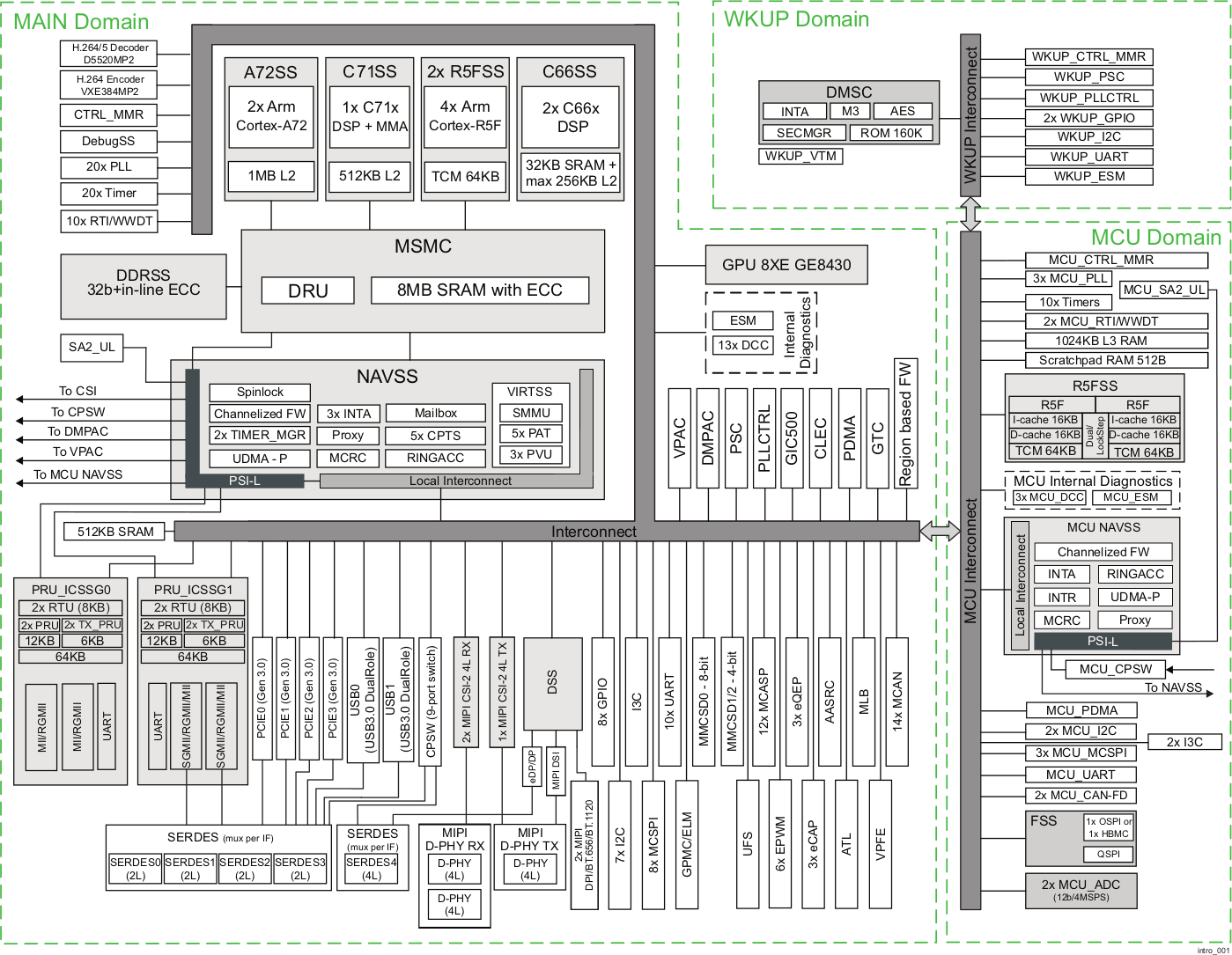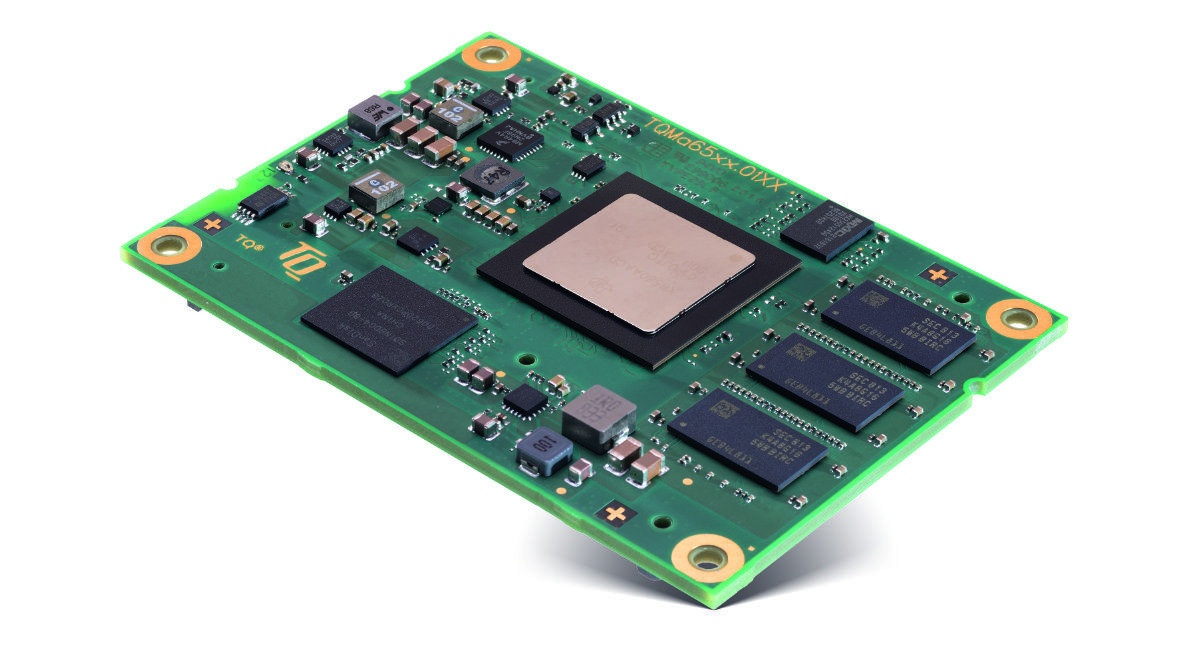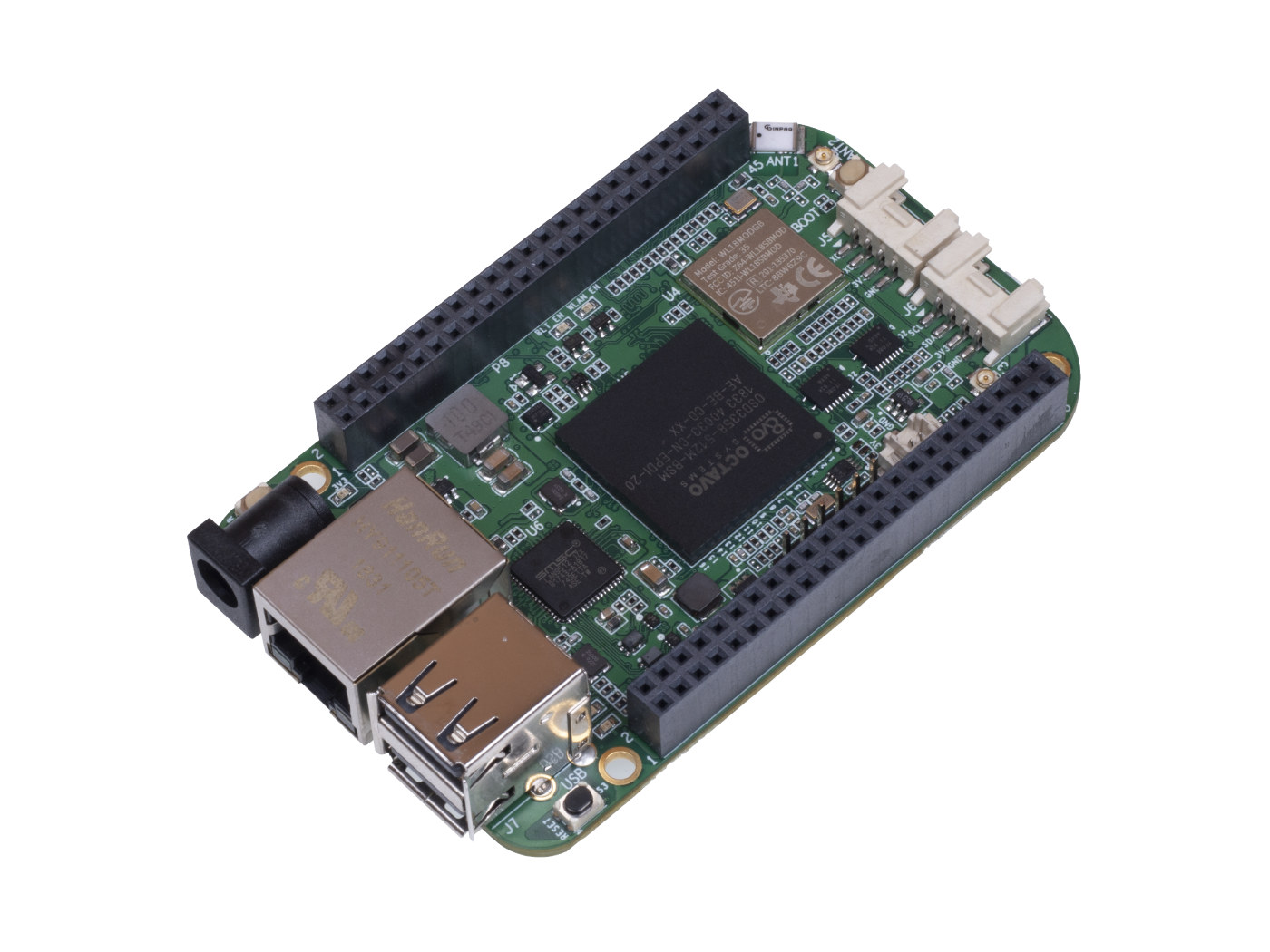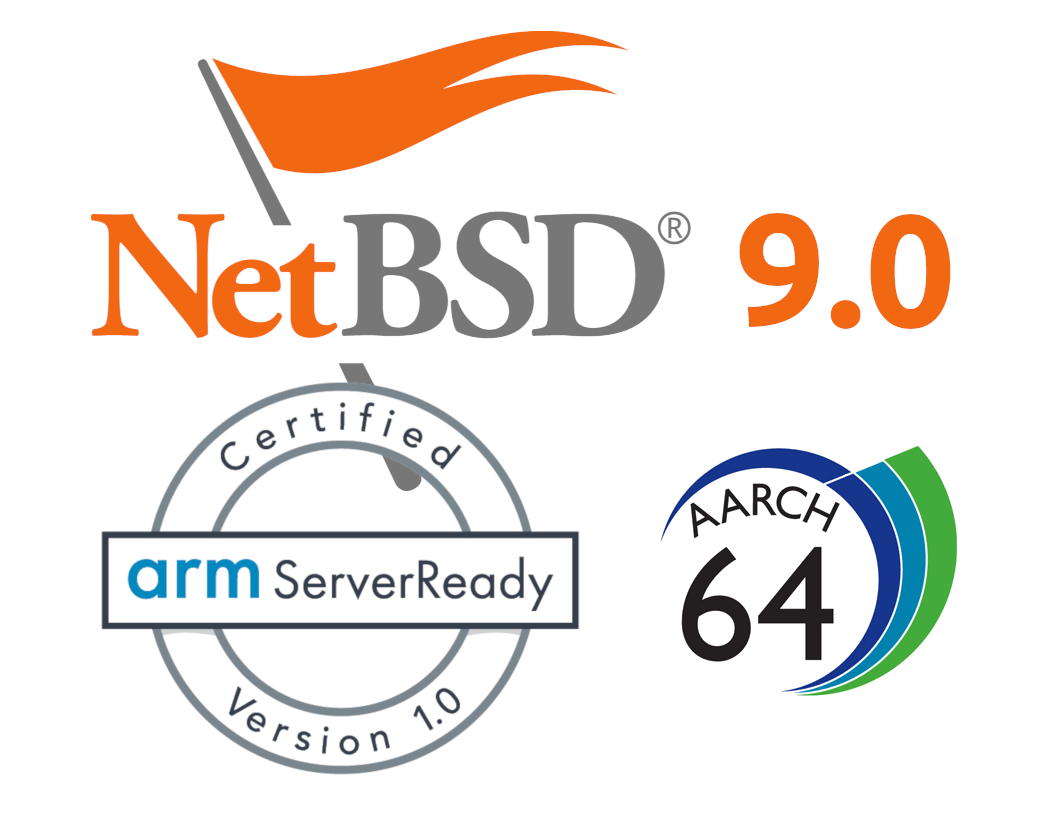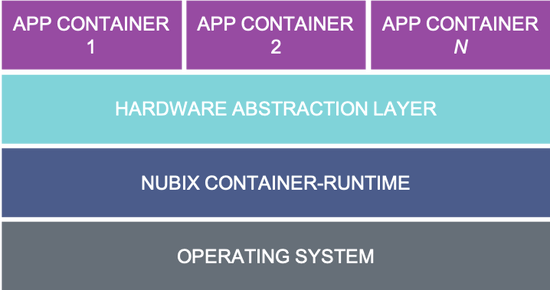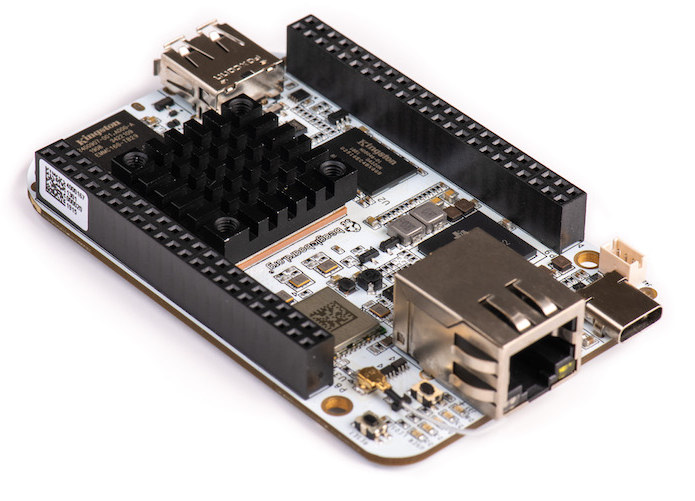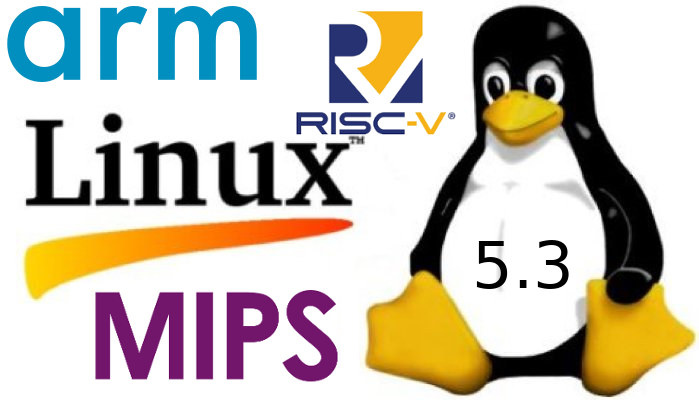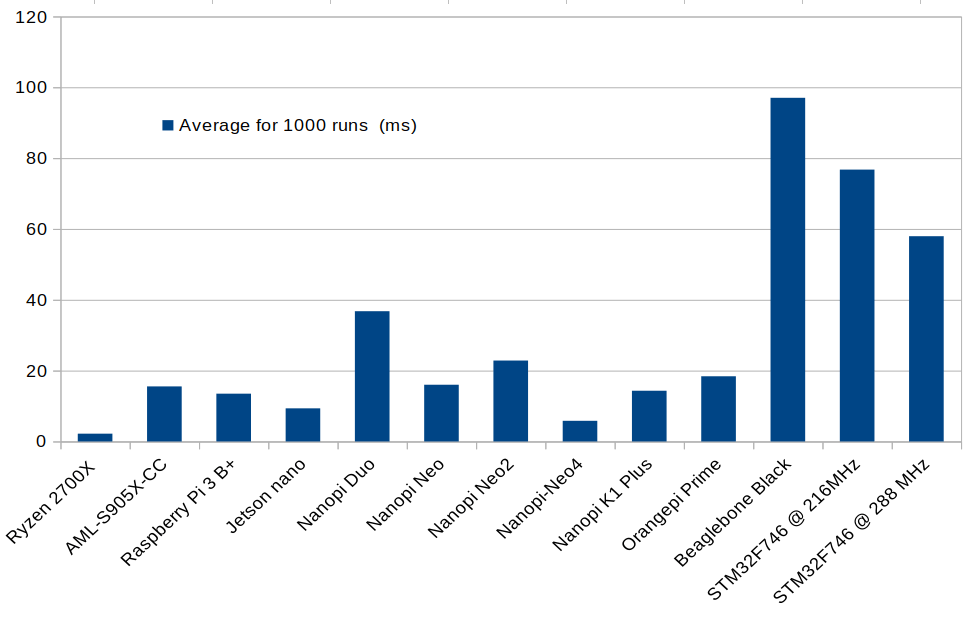Texas Instruments unveiled their first 64-bit processor in 2018 with TI AM654 “Keystone III” quad-core Arm Cortex-A53 + dual lockstep Cortex-R5F processor designed for general embedded and industrial applications. The company is now working on a more powerful processor with J721E SoC with Cortex-A72 cores belonging to the K3 Multicore SoC architecture platform appearing in TI Linux git repository. Ti J721E is a monster of an SoC, not necessarily in terms of CPU processing power, but it has an amazing amount of features and peripherals. I’m not going to list all specifications of this monster SoC, and we’ll do with J721E highlights instead: CPU Dual Cortex-A72 up to 2.0 GHz in a single cluster Up to three clusters of lockstep capable dual Cortex-R5F MCUs @ 1.0 GHz AI Accelerator / DSP Deep-learning Matrix Multiply Accelerator (MMA) @ up to 1.0 GHz (8 TOPS for 8-bit inference) C7x floating-point Vector DSP […]
TQMa65xx Embedded Module Features TI Sitara AM65xx SoC, Six TSN Ethernet Interfaces
Texas Instruments Sitara AM654 Cortex-A53/R5 SoC was launched in 2018 as the first 64-bit processor from the company and specifically targetting Gigabit industrial Ethernet networks with support for Time-Sensitive Networking (TSN). Since the processor launch, we’ve seen a couple of Sitara AM65xx modules such as PHYTEC phyCORE-AM65x SoM and Mistral AM65x Industrial SOM. There’s now another option with TQ Embedded TQMa65xx embedded module featuring a choice of 5 AM65xx dual-/quad-core processor, up to 4GB RAM, up to 64GB eMMC flash, and various I/Os via a 560-pin connector that includes six Gigabit TSN Ethernet interfaces. TQ Embedded TQMa65xx embedded module specifications: SoC – Texas Instruments Sitara AM6526, AM6527, AM6528, AM6546, or AM6548 with dual-core or quad-core Cortex-A53 processor @ 1.1 GHz, dual Cortex-R5 dual-lockstep processor @ 400 MHz, optional Imagination SGX544 GPU (AM6xx8 SKU) System Memory – Up to 4GB DDR4 SDRAM with optional ECC Storage – Up to 64GB eMMC […]
BeagleBone Green Gateway SBC with Ethernet, WiFi, and Bluetooth Launched for $60
BeagleBone Green Gateway SBC was first unveiled last July as an update to BeagleBone Green Wireless board with Ethernet, and Octavo Systems OSD3358 SiP along with some smaller changes like support for 12V power supply and I2C RTC + battery. The board did however lose two USB 2.0 ports to make space for the Ethernet connector. The board was not quite available at the time, but the good news is that you can now buy BeagleBone Green Gateway for $59.99 on Seeed Studio. Specifications have remained the same as the ones provided for the initial announcement: SiP – Octavo Systems OSD3358 with Texas Instruments AM3358 Arm Cortex-A8 processor @ 1.0 GHz, 2×32-bit 200-MHz programmable real-time units (PRUs), 3D graphics accelerator, 512MB DDR3 SDRAM, 4KB EEPROM, and integrated power management Storage – 4GB 8-bit eMMC on-board flash storage (Kington) + microSD socket Connectivity 10/100Mbps Ethernet (RJ45) WiFi 802.11 b/g/n 2.4GHz + […]
NetBSD 9.0 Released with Aarch64 Support, Arm ServerReady Compatibility
Yesterday, we wrote about Raspberry Pi 4 getting UEFI+ACPI firmware for Arm SSBR compliance allowing the board to run operating systems designed for “Arm ServerReady” servers out of the box. NetBSD 9.0 was just released on February 14, 2020, with support for Aarch64 (64-bit Arm) which had been in the works for a few years, and includes support for “Arm ServerReady” compliant machines (SBBR+SBSA). NetBSD 9.0 main changes related to hardware support: Support for AArch64 (64-bit Armv8-A) machines Compatibility with “Arm ServerReady” compliant machines (SBBR+SBSA) using ACPI. Tested on Amazon Graviton and Graviton2 (including bare metal instances), AMD Opteron A1100, Ampere eMAG 8180, Cavium ThunderX, Marvell ARMADA 8040, QEMU w/ Tianocore EDK2 Symmetric and asymmetrical multiprocessing support (big.LITTLE) Support for running 32-bit binaries via COMPAT_NETBSD32 on CPUs that support it Single GENERIC64 kernel supports ACPI and device tree based booting Supported SoCs Allwinner A64, H5, H6 Amlogic S905, S805X, S905D, […]
Nubix Edge-native Tiny Containers for IoT Apps Released For Raspberry Pi and BeagleBone SBCs
Nubix has just launched the developer edition of its edge-native tiny containers for IoT application development and analytics that target microcontrollers and single-board computers such as Raspberry Pi 3/4 and BeagleBone Black. Typical cloud solutions such as Docker are often too large with tiny IoT devices, and to solve these issues, Nubix tiny containers are sized in kilobytes, instead of megabytes, or about 100 times smaller than a Docker container, in order to be small enough to run at the edge. Nubix.io provides access to a library of sensors, analytics and tiny services that leverage open source languages and pre-packaged functions to easily create IoT applications in a few minutes. Analytics is commonly done in the cloud, which may cause issues in environments with limited or intermittent connectivity, so to solve this issue, Nubix provides analytics functionality directly on the IoT device, eliminating the latency, bandwidth, connectivity and cost constraints […]
$118 BeagleBone-AI SBC is Made for AI Edge Applications
The BeagleBoard.org Foundation introduced BeagleBone-AI SBC at Embedded World 2019 last February. The board is specifically designed for artificial intelligence workloads at the edge thanks to Texas Instruments AM5729 dual-core Cortex-A15 processor that embeds a dual-core C66x DSP, and 4 EVE (Embedded Vision Engine) cores. The BeagleBone Black compatible board was not available at the time, but the Foundation has now formally launched the board, and you can buy BeagleBone-AI for $118 and up with heatsink and antenna on sites such as Mouser, OKdo, or Newark. BeagleBone-AI full specifications have now been published: SoC – TI Sitara AM5729 with Dual-core Cortex-A15 processor @ 1.5 GHz 2x dual-core PRUs 2x Cortex-M4 real-time cores dual core C66x VLIW DSP 4x EVEs 2.5MB of on-chip L3 RAM VA-HD subsystem with support for 4K at 15fps H.264 encode/decode and other codecs at 1080p60 Vivante GC320 2D graphics accelerator Dual-Core PowerVR SGX544 3D GPU System […]
Linux 5.3 Release – Main Changes, Arm, MIPS & RISC-V Architectures
Linus Torvalds has just announced the release of Linux 5.3: So we’ve had a fairly quiet last week, but I think it was good that we ended up having that extra week and the final rc8. Even if the reason for that extra week was my travel schedule rather than any pending issues, we ended up having a few good fixes come in, including some for some bad btrfs behavior. Yeah, there’s some unnecessary noise in there too (like the speling fixes), but we also had several last-minute reverts for things that caused issues. One _particularly_ last-minute revert is the top-most commit (ignoring the version change itself) done just before the release, and while it’s very annoying, it’s perhaps also instructive. What’s instructive about it is that I reverted a commit that wasn’t actually buggy. In fact, it was doing exactly what it set out to do, and did it […]
TensorFlow Lite for Microcontrollers Benchmarked on Linux SBCs
Dimitris Tassopoulos (Dimtass) decided to learn more about machine learning for embedded systems now that the technology is more mature, and wrote a series of five posts documenting his experience with low-end hardware such as STM32 Bluepill board, Arduino UNO, or ESP8266-12E module starting with simple NN examples, before moving to TensorFlow Lite for microcontrollers. Dimitris recently followed up his latest “stupid project” (that’s the name of his blog, not being demeaning here :)) by running and benchmarking TensorFlow Lite for microcontrollers on various Linux SBC. But why? you might ask. Dimitris tried to build tflite C++ API designed for Linux, but found it was hard to build, and no pre-built binary are available except for x86_64. He had no such issues with tflite-micro API, even though it’s really meant for baremetal MCU platforms. Let’s get straight to the results which also include a Ryzen platform, probably a laptop, for […]


